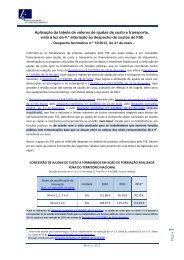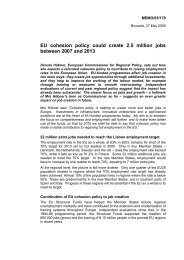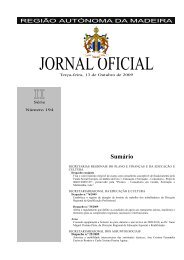Industrial Relations in Europe 2012 - European Commission - Europa
Industrial Relations in Europe 2012 - European Commission - Europa
Industrial Relations in Europe 2012 - European Commission - Europa
Create successful ePaper yourself
Turn your PDF publications into a flip-book with our unique Google optimized e-Paper software.
demand for healthcare services and social services, coupled with an age<strong>in</strong>g workforce and<br />
difficulties <strong>in</strong> recruit<strong>in</strong>g and reta<strong>in</strong><strong>in</strong>g healthcare workers. Given the demand<strong>in</strong>g nature of the work<br />
<strong>in</strong> this sector, ensur<strong>in</strong>g an optimal work<strong>in</strong>g environment is particularly important <strong>in</strong> order to ensure<br />
that patients receive high-quality care. The f<strong>in</strong>ancial and economic crisis affects the healthcare<br />
sector <strong>in</strong> different ways <strong>in</strong> different countries. In the view of the social dialogue committee, cuts <strong>in</strong><br />
healthcare resources as applied <strong>in</strong> some Member States are short-sighted measures with detrimental<br />
consequences for public health, the availability of health care staff and <strong>in</strong>frastructures. To ma<strong>in</strong>ta<strong>in</strong><br />
and further improve the services, the committee urges Members States to ma<strong>in</strong>ta<strong>in</strong> their autonomy<br />
and capacity to plan services and organise resources at local, regional and national level, with a<br />
view to secur<strong>in</strong>g and build<strong>in</strong>g the overall susta<strong>in</strong>ability of healthcare systems. HOSPEEEM and<br />
EPSU commented as well on the Action Plan for the EU Health Workforce and issued a jo<strong>in</strong>t<br />
statement on the subject <strong>in</strong> September <strong>2012</strong>. The Action Plan is a component of the so-called<br />
“Employment Package” which focuses on growth and employment <strong>in</strong> <strong>Europe</strong>. The social partners<br />
agree with the analysis of quantitative trends presented <strong>in</strong> the Action Plan and suggested several<br />
ways of improv<strong>in</strong>g the situation <strong>in</strong> the sector, for example, earmark<strong>in</strong>g EU funds (ESF) <strong>in</strong> order to<br />
reta<strong>in</strong> health workers <strong>in</strong> countries suffer<strong>in</strong>g from outward migration of these workers.<br />
In September 2010, the <strong>Europe</strong>an Trade Union Committee for Education (ETUCE) organised a<br />
conference on the impact of the economic crisis on the education sector, with contributions from<br />
the <strong>Europe</strong>an Federation of Education Employers (EFEE) and the <strong>Europe</strong>an <strong>Commission</strong>. The<br />
results of two surveys carried out <strong>in</strong> 2009-2010 and presented at the conference were very diverse,<br />
although the overall trend is worry<strong>in</strong>g, <strong>in</strong> particular regard<strong>in</strong>g public spend<strong>in</strong>g on education and on<br />
teachers' work<strong>in</strong>g conditions. The social dialogue committee established <strong>in</strong> June 2010 adopted its<br />
first jo<strong>in</strong>t op<strong>in</strong>ion on education, tra<strong>in</strong><strong>in</strong>g and research, entitled Invest<strong>in</strong>g <strong>in</strong> the future, <strong>in</strong> January<br />
2011. Programmes of fiscal consolidation should, <strong>in</strong> the op<strong>in</strong>ion of the EU-level social partners <strong>in</strong><br />
this sector, give priority to areas of spend<strong>in</strong>g that are an <strong>in</strong>vestment <strong>in</strong> the future, thereby support<strong>in</strong>g<br />
access to learn<strong>in</strong>g at all levels. Member States and employers should make the appropriate<br />
<strong>in</strong>vestments and organisational arrangements to ensure that all <strong>Europe</strong>ans are provided with<br />
attractive opportunities for lifelong learn<strong>in</strong>g. While accept<strong>in</strong>g that education should cont<strong>in</strong>ue to be a<br />
national competence and that it should therefore not be regulated at <strong>Europe</strong>an level, the social<br />
partners support the EU <strong>in</strong>itiatives of mutual learn<strong>in</strong>g and coord<strong>in</strong>ation of policies, as well as EUfunded<br />
education and tra<strong>in</strong><strong>in</strong>g programmes. The social partners see it as their responsibility to work<br />
together to <strong>in</strong>fluence <strong>Europe</strong>an <strong>in</strong>itiatives so as to ensure that they are useful and practical.<br />
In April <strong>2012</strong> the social partners <strong>in</strong> the postal services social dialogue committee signed a new<br />
jo<strong>in</strong>t declaration on the evolution of their sector. It sets key pr<strong>in</strong>ciples to better guide the profound<br />
restructur<strong>in</strong>g that is affect<strong>in</strong>g all postal companies <strong>in</strong> <strong>Europe</strong>: anticipation of change, recognition<br />
that change management benefits from cooperation between social partners, development of the<br />
employability of workers and encouragement of <strong>in</strong>vestment <strong>in</strong> the postal sector. The declaration<br />
updates an earlier document dat<strong>in</strong>g from 2007 and builds upon the conclusions drawn from several<br />
projects co-f<strong>in</strong>anced by the EU, with<strong>in</strong> which the <strong>Europe</strong>an social partners <strong>in</strong> the postal sector set<br />
up a social observatory.<br />
In the postal sector social partners are also <strong>in</strong> cont<strong>in</strong>uous co-operation and <strong>in</strong>formation exchange<br />
with the <strong>Commission</strong> with regard to postal reform and sector developments. They play an important<br />
role <strong>in</strong> the Postal Users Forum organised by the <strong>Commission</strong> once per year <strong>in</strong> Brussels, where<br />
postal services users, postal operators and trade unions discuss the effects of postal liberalisation <strong>in</strong><br />
direct dialogue with the <strong>Commission</strong>er and/or high level representatives from the <strong>Commission</strong>.<br />
273

















